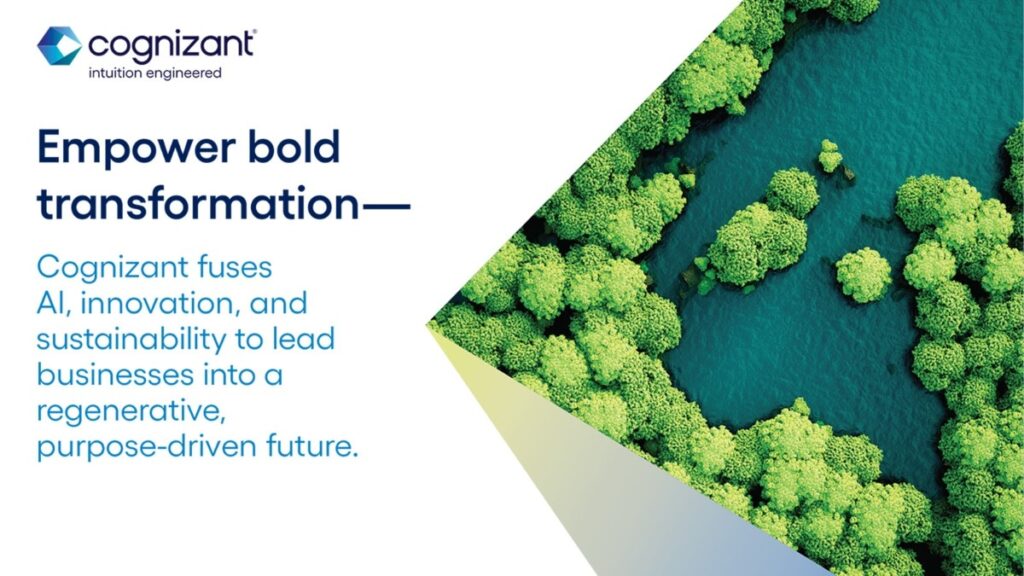This current generation of CEOs will be the last to oversee a fully human workforce. In the near term, companies will need to manage the interaction and impact of both human and agentic staff. To differentiate in the market, it will be essential to demonstrate the unique value of AI – not just from a technological standpoint, but also, critically, from an environmental and climate impact perspective. AI holds the key to unlocking unprecedented efficiencies and innovative solutions for sustainability. Measuring the environmental impact of AI is key – not only to understand and reduce its footprint–but to build the foundation for demonstrating its sustainability value to customers. At Cognizant, we believe in harnessing the transformative power of AI to build a greener tomorrow, both by applying AI for sustainability and by making AI itself sustainable.
AI: A catalyst for a sustainable world
AI’s ability to process and analyze vast amounts of data, identify intricate patterns, and make intelligent predictions offers sustainability solutions that traditional approaches often cannot match. Consider the energy sector, where AI algorithms can optimize energy consumption in buildings and industrial processes, leading to significant reductions in power usage. Smart grids powered by AI can better integrate renewable energy sources, ensuring a more efficient and reliable energy distribution. In transportation and logistics, AI-driven route optimization minimizes fuel consumption and emissions. Manufacturing benefits from AI’s ability to optimize resource utilization and reduce waste.
Beyond optimization, AI excels at prediction and monitoring. It can analyze satellite imagery and weather patterns to, aid in climate change forecasting, improve the management of renewable energy generation, and for more accurate wildfire prediction. AI-powered systems can monitor environmental health, track deforestation, and analyze air and water quality. In agriculture, AI enables precision farming, optimizing water and fertilizer use. These are just a few examples of how AI is revolutionizing our approach to sustainability. Cognizant is at the forefront of this transformation, developing AI-powered solutions that help businesses across industries achieve their sustainability goals.
Addressing AI’s own footprint: A responsibility we share
While AI offers immense potential for sustainability, the AI industry itself has a significant environmental footprint. Affordable, reliable and sustainable electricity & water supply will be a crucial determinant of AI development. The energy required to train and run increasingly complex AI models is substantial. Datacentres, the backbone of AI infrastructure, consume vast amounts of electricity and water for cooling. The production and disposal of AI hardware contribute to the growing problem of electronic waste. Let’s look at some data points to highlight the importance of frugality and automation.
• A typical AI-focused data centre consumes as much electricity as 100,000 households, but the largest ones under construction today will consume 20 times as much.
• Estimates of data center electricity use range from 200 – 400 TWh
• Emissions from electricity use by data centres grows from 180 million tonnes (Mt) today to 300 Mt in the base case by 2035. On average a 100 MW hyperscale data centre in the United States consumes around 2 million litres of water per day in total – equivalent to about 6,500 households.
Addressing this challenge requires a multi-faceted approach. Energy efficiency in AI models and algorithms is paramount. Promoting sustainable hardware practices and embracing green software engineering principles within the AI lifecycle are also essential.
Cognizant: Engineering a sustainable AI ecosystem
Cognizant sustainability services will bring together real-world environmental impact, software, and modelling expertise to optimize AI’s impact in managing unprecedented business transformation while keeping our clients’ sustainability ambitions on track. Deploying AI at scale presents an opportunity as well as brings its own challenges, wherein we balance AI adoption &integration with managing the emission targets for clients. Our services encompass:
• Net Zero Pathways: Helping organizations define and execute strategies to achieve net-zero emissions by utilizing AI for accurate environmental data analysis and optimization.
• Sustainability and ESG Reporting: Automating data collection and enhancing accuracy through AI-powered platforms for sustainability and ESG reporting.
• Sustainable Operations: Utilizing AI-driven digital twins and predictive maintenance to help reduce waste and improve efficiency for sustainable operations.
• Sustainable Products: Guiding clients in developing eco-friendly products and business models, leveraging AI for lifecycle assessments and resource optimization.
• Sustainable Supply Chains: Focusing on using AI to analyze and reduce the environmental impact of products throughout their lifecycle to make sustainable supply chains.
• Sustainable IT: Helping IT departments minimize their carbon footprint through cloud optimization and green application architecture.
Beyond applying AI for sustainability, Cognizant is also focused on making AI itself more sustainable. We adhere to Responsible AI principles, including the development of scalable and sustainable AI solutions. Cognizant has achieved ISO 42001:2023 certification for our AI management system, demonstrating our commitment to responsible and sustainable AI development and deployment. We are actively working on improving energy efficiency within our IT infrastructure by shifting to cloud-based solutions and optimizing our data centers. Our AI Research Lab is dedicated to advancing trustworthy and ethical AI systems, which includes a focus on minimizing environmental impact. Furthermore, through our Sustainable IT services, we help other organizations reduce the carbon footprint of their IT operations.
Leading the Way Towards a Greener Future
Engineering a sustainable future requires a holistic approach that considers both the potential of AI for environmental good and the environmental impact of AI itself. Companies like Cognizant have a crucial role to play in leading this transformation. By integrating sustainability into our core strategy, investing in green AI solutions, and fostering a culture of environmental responsibility, we are committed to helping our clients and the world build a truly sustainable AI-powered future. The journey requires continuous innovation, collaboration, and a steadfast commitment to balancing technological advancement with environmental stewardship.
At Cognizant, we are proud to be at the forefront of engineering this vital change.
This article is co-authored by:
• Rajiv Mukherjee – Sustainability Practice Leader
• Vernon Turner, Bindiya KR and Vasudev Athalye – Sustainability Subject Matter Experts
Source:https://www.businesstoday.in/impact-feature/story/engineering-a-sustainable-ai-first-future-479743-2025-06-10?utm_source=rssfeed

